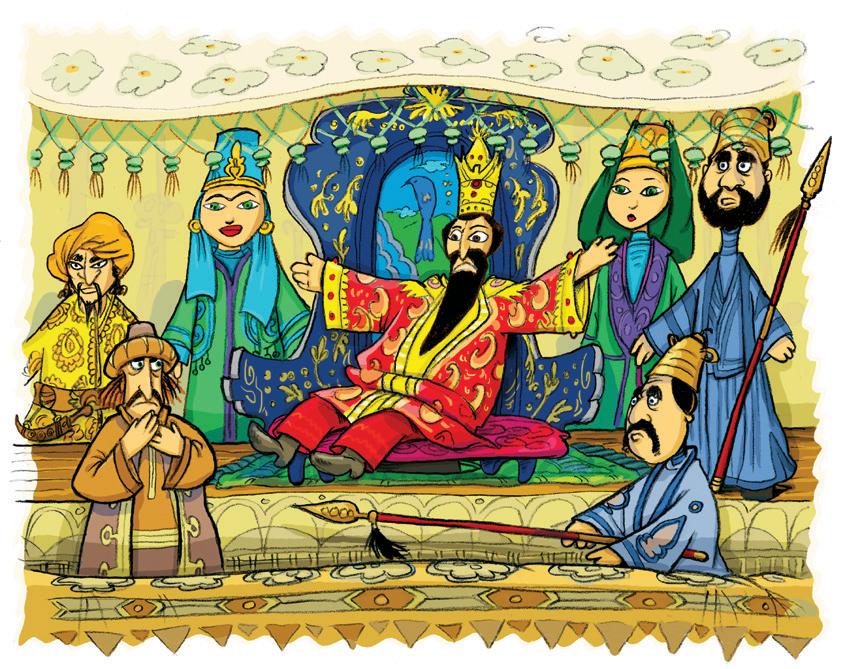
3 minute read
The Puppet Show
A Brief Timeline The Life of Bahá ’u’lláh
The highlighted area marks the time in which this story takes place.
1817 November 12
Birth of Bahá’u’lláh in Tihrán, Iran
1844
Recognizes the Báb as a new Messenger of God
1852
Imprisonment in the “Black Pit” of Tihrán
1853–1863
Exile in Baghdád, Iraq. From 1854–1856, He goes into the mountains to pray in solitude.
1863 April
Declares Divine Mission as Prophet-Founder of the Bahá’í Faith
1863–1868
Exile in Constantinople (Istanbul), then Adrianople (Edirne), Turkey. Begins writing letters to kings and rulers in 1867, urging world unity
1868
Last exile, to prisoncity of ‘Akká, Israel
1877
Finally free to live in countryside homes of Mazra‘ih and then Bahjí, outside ‘Akká
1892 May 29
Bahá’u’lláh passes away at Bahjí.
The Puppet Show
Atheater performance can make you laugh, cry, or want to dance and sing. As a child, Bahá’u’lláh saw a puppet show that He said changed His view of the world.
Bahá’u’lláh’s father, Mírzá Buzurg, was a minister in the court of the sháh (the king). When Bahá’u’lláh was a child, one of His older brothers got married—and the festivities lasted for seven days! On the last day, a puppet show was performed for the guests’ entertainment.
Bahá’u’lláh watched eagerly as the show began. Human-like puppets called, “His Majesty is coming! Arrange the seats at once!” They quickly prepared for the puppet king’s arrival. More puppets gathered—noblemen, soldiers, and servants of the king’s royal court.
Finally, the king made a grand entrance wearing a magnificent crown, and he proudly sat on his high throne. Trumpets sounded, and a thief was brought before the court. The king ordered his execution. Immediately, the thief was put to death! Then the king learned that a rebellion had broken out. He sent his army into battle, and cannons were fired. Bahá’u’lláh watched the scene “with great amazement.”
After the show ended, a man came out from behind the scenery, carrying a box.
“What is this box,” Bahá’u’lláh asked him, “and what was the nature of this display?”
The man replied, “All this lavish display and these elaborate devices, the king, the princes, and the ministers, their pomp and glory, their might and power, everything you saw, are now contained within this box.”
From that day on, Bahá’u’lláh said, He saw worldly power as no more important
When Bahá’u’lláh was a child, a puppet show called Sháh Sultán Salím was performed for His family and their guests, who included princes and other leaders.
than a puppet show. He wrote, “All the trappings of the world . . . have never been, nor will they ever be, of any weight and consequence, be it to the extent of a grain of mustard seed . . . These visible treasures, these earthly vanities, these arrayed armies . . . all shall pass into the confines of the grave, as though into that box.”
In 1839, when Mírzá Buzurg passed away, Bahá’u’lláh was offered His father’s position at court. But Bahá’u’lláh turned it down. Instead, He spent His time serving people in need and sharing His wealth with them.
Bahá’u’lláh later proclaimed His message of peace. Trying to stop Him, the authorities persecuted, imprisoned, and exiled Him. He lost His wealth. But as the puppet show from His childhood had shown, He knew that only spiritual wealth lasts. He wrote to kings and rulers of His day, urging them to stop injustice and establish peace. Today, Bahá’ís around the globe work to put Bahá’u’lláh’s teachings into practice and help build global justice and unity.


